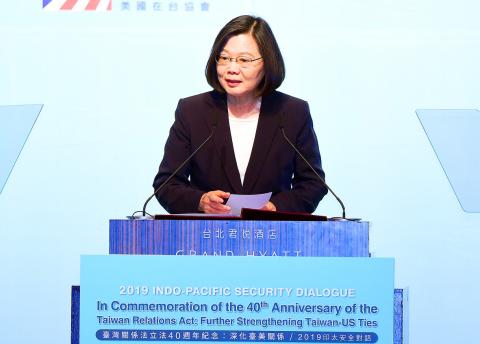Taiwan has not been intimidated by China’s military drills this week, President Tsai Ing-wen (蔡英文) said yesterday, while a senior US official denounced the latest Chinese maneuvers as “coercion” and a threat to regional stability.
Tsai said Taiwan was resolute in its defense.
“China’s armed forces yesterday [Monday] sent a large number of military aircraft and naval vessels into our vicinity. Their actions threaten Taiwan and other like-minded countries in the region,” Tsai said at a forum cohosted by the Ministry of Foreign Affairs to mark the 40th anniversary of the US’ Taiwan Relations Act.

Photo: Liao Chen-huei, Taipei Times
The event was attended by a delegation led by former US House of Representatives speaker Paul Ryan.
“These actions only serve to strengthen our resolve. Our military forces have the capacity, determination and commitment to defend Taiwan and not allow coercion to dictate our own future,” Tsai said.
She also said that US President Donald Trump’s administration had notified Taipei that its pilots could continue training at the Luke Air Force Base in Arizona.
“It enhances their abilities to defend our airspace. I want to express my appreciation to the US government for the announcement,” she said.
Taiwan scrambled jets and ships to monitor the Chinese forces on Monday, the Ministry of National Defense said, accusing Beijing of “trying to change the ‘status quo’ of the Taiwan Strait.”
China’s Taiwan Affairs Office said that Taipei was seeking to “slander” China and mislead the public with its criticism of the exercises to provoke confrontation.
“No person or any force should underestimate our firm determination and strong ability to defend the country’s sovereignty and territorial integrity,” it said.
The People’s Liberation Army Daily said the goal of the drills was to practice a “combined firepower assault” that included electronic jamming from aircraft under the protection of fighter jets.
Bombers “screamed” toward the area and carried out “sudden attacks,” while warships occupied assault positions and conducted attacks on enemy fire points, the official paper of China’s military said.
Landing forces reached specified waters, which were circled by helicopters at low altitude.
The paper cited a Chinese military representative as saying the exercises were held annually and “completely within the normal legal rights of a sovereign country.”
China has repeatedly carried out what it calls “island encirclement patrols” in the past few years.
Ryan said that the US considered any military threat to Taiwan a concern and urged China to stop, saying it was counterproductive.
“I urge Beijing to choose the path of peace, respect, and civility by resuming dialogue with Taiwan’s democratically elected administration,” he said.
Tsai said she wants to maintain the “status quo” with China, but would defend Taiwan’s security and democracy.
The visit by US officials comes weeks after Tsai said the US was responding positively to Taipei’s requests for new arms sales to bolster its defenses in the face of growing pressure from China.

Taiwan is projected to lose a working-age population of about 6.67 million people in two waves of retirement in the coming years, as the nation confronts accelerating demographic decline and a shortage of younger workers to take their place, the Ministry of the Interior said. Taiwan experienced its largest baby boom between 1958 and 1966, when the population grew by 3.78 million, followed by a second surge of 2.89 million between 1976 and 1982, ministry data showed. In 2023, the first of those baby boom generations — those born in the late 1950s and early 1960s — began to enter retirement, triggering

ECONOMIC BOOST: Should the more than 23 million people eligible for the NT$10,000 handouts spend them the same way as in 2023, GDP could rise 0.5 percent, an official said Universal cash handouts of NT$10,000 (US$330) are to be disbursed late next month at the earliest — including to permanent residents and foreign residents married to Taiwanese — pending legislative approval, the Ministry of Finance said yesterday. The Executive Yuan yesterday approved the Special Act for Strengthening Economic, Social and National Security Resilience in Response to International Circumstances (因應國際情勢強化經濟社會及民生國安韌性特別條例). The NT$550 billion special budget includes NT$236 billion for the cash handouts, plus an additional NT$20 billion set aside as reserve funds, expected to be used to support industries. Handouts might begin one month after the bill is promulgated and would be completed within

NO CHANGE: The TRA makes clear that the US does not consider the status of Taiwan to have been determined by WWII-era documents, a former AIT deputy director said The American Institute in Taiwan’s (AIT) comments that World War-II era documents do not determine Taiwan’s political status accurately conveyed the US’ stance, the US Department of State said. An AIT spokesperson on Saturday said that a Chinese official mischaracterized World War II-era documents as stating that Taiwan was ceded to the China. The remarks from the US’ de facto embassy in Taiwan drew criticism from the Ma Ying-jeou Foundation, whose director said the comments put Taiwan in danger. The Chinese-language United Daily News yesterday reported that a US State Department spokesperson confirmed the AIT’s position. They added that the US would continue to

IMPORTANT BACKER: China seeks to expel US influence from the Indo-Pacific region and supplant Washington as the global leader, MAC Minister Chiu Chui-cheng said China is preparing for war to seize Taiwan, Mainland Affairs Council (MAC) Minister Chiu Chui-cheng (邱垂正) said in Washington on Friday, warning that Taiwan’s fall would trigger a regional “domino effect” endangering US security. In a speech titled “Maintaining the Peaceful and Stable Status Quo Across the Taiwan Strait is in Line with the Shared Interests of Taiwan and the United States,” Chiu said Taiwan’s strategic importance is “closely tied” to US interests. Geopolitically, Taiwan sits in a “core position” in the first island chain — an arc stretching from Japan, through Taiwan and the Philippines, to Borneo, which is shared by